- Main page
- News of the year
News of the year
 6/18/2023
LEARNING ENGLISH IN A NON-ENGLISH-SPEAKING ENVIRONMENT:
6/18/2023
LEARNING ENGLISH IN A NON-ENGLISH-SPEAKING ENVIRONMENT:
CHALLENGES AND REWARDS FOR AL-FARABI UNIVERSITY INTERNATIONAL STUDENTS
Learning a new language can be daunting, but for many university students, it is a challenge, especially in a non-English speaking environment. To succeed in learning English in a non-English speaking environment, students must approach it with dedication and a willingness to practice and study. This may mean seeking additional resources, such as conversation groups, tutors, or online learning tools, and extra time outside class. It may also mean stepping outside one's comfort zone and taking risks, such as speaking English with non-native speakers or attending events where not only English is spoken. Still, it challenges many students and al-Farabi University international students, respectively.
One of the most significant benefits of studying a language at the university level is the opportunity to immerse oneself in the language and culture. Many language programs offer study abroad options or international exchange programs. Al-Farabi University is a leader in the market of educational services for foreigners, among other educational institutions in Kazakhstan. That is why more and more people who want to get an education at al-Farabi University are Kazakhstanis and students from other countries. The university's educational programs have attracted over 5,000 international students from about 80 countries. The high positions of KazNU in the world rankings facilitate this. The presence of foreign youth demonstrates the relevance of the university and raises the prestige of Kazakhstani education and the state’s authority on the world stage.
The Department of Foreign Languages also significantly contributes to meeting students’ expectations.. In addition to conventional language classes, the department offers English learning opportunities through extracurricular activities. For example, English clubs or conversation groups may meet regularly to practice speaking and listening skills. These groups are often led by native speakers or advanced students, providing an opportunity to learn from those with more experience. However, language learning at KazNU also comes with its own set of challenges. One of the biggest challenges of learning English from a non-native speaker is understanding their pronunciation and grammar. Non-native speakers may have an accent or use grammatical structures different from native speakers. This can make it difficult for students to understand and communicate effectively. Here are the fragments of the talks with our international students from the Physics and Technologies Faculty on the challenges and rewards of studying English at al-Farabi University.
"One of the biggest challenges of learning English in a non-English speaking environment is the need for more exposure to the language," said Shir Agha Shahryar from Tajikistan."We have a few hours of English instruction per week and a few opportunities to practice speaking and listening outside the class. Additionally, we need to help understand English spoken by non-native speakers who speak with accents and use idiomatic expressions unfamiliar to international students."
Despite these challenges, many students find that learning English in a non-English speaking environment can be an enriching experience. For example, Yama Assel from Afghanistan claimed: "Learning English at KazNU was one of my life's most challenging and rewarding experiences. The classes were intense and demanding, but I learned so much and could apply what I learned during my study in Kazakhstan experience in Afghanistan. Communicating English in a non-English speaking country and navigating a different culture was truly transformative."
Rafiqullah Hamdardshared expresses a similar sentiment: "Studying English in a non-English speaking environment was challenging, but it was also advantageous because of the new experience. In addition to traditional language classes, the university offers language learning opportunities through extracurricular activities. These conversation groups meet regularly to practice speaking and listening skills. They are led by native speakers or sometimes advanced students, allowing participants to learn from those with more experience."
Similarly, Mustafa Rahime found his experience helpful. "Even though Kazakhstan does not use English, here we managed to artificially create conditions for immersion in the language environment. Firstly, most young people speak English well. In Kazakhstan, English is characterized as a means of social, economic, educational, and cultural development of society. An illustration of this is the "Trinity of Languages" project launched in 2007, in which English is assigned a special status - the language of integration into the world economy. Secondly, citizens of Kazakhstan are provided with high-quality Internet and home broadband Internet access networks. And this is great because such an Internet makes it easy to access e-books, newspapers, and magazines, listen to podcasts and music, and watch movies, shows and news from English-language sources. And thirdly, our English language teachers create an atmosphere of immersion in the atmosphere of the English-speaking environment in the classroom through the use of video materials, multimedia, and role-playing games in their work. In their classes, teachers insist that students talk more in English, and in this way, we learn vocabulary and grammar without memorizing rules and words. All students enjoyed the process and did not motivate themselves only because learning a language is necessary. The primary purpose of learning English is not only the formation and development of the communicative culture of people learning the language but also their training in practical mastery of the English language."
To succeed in learning English from a non-native speaker, Foreign languages department staff offer their students different teaching styles and methods. They bring their unique perspectives and experiences to the classroom. For example, they work on getting a deep understanding of the culture and language of their students' native language, which helps them tailor their teaching methods to be more effective. They are also empathetic to students’ challenges in learning English in a non-English-speaking environment, as they have likely experienced those challenges themselves. They proactively seek additional resources, such as conversation groups or online learning tools, to engage students for meaningful and productive learning.
Learning English from a non-native speaker can be challenging and rewarding. While it may require extra effort on the part of the student, it can also provide a unique opportunity for cultural understanding and empathy. Students can make significant strides in their English language skills by approaching the experience with an open mind and a willingness to learn.
Jamila Dosmagambetova,
Candidate of Philosophical Sciences, Head of Foreign Languages Department, Al-Farabi Kazakh National University
Perizat Yelubayeva,
candidate of pedagogical sciences, associate professor of the Foreign Languages Department, Al-Farabi Kazakh National University
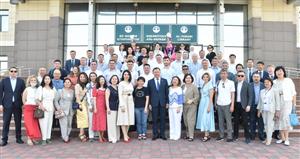 6/10/2023
A TRAINING SESSION ON THE «DATA-DRIVEN DECISION MAKING» PROGRAM TOOK PLACE AT KAZNU
6/10/2023
A TRAINING SESSION ON THE «DATA-DRIVEN DECISION MAKING» PROGRAM TOOK PLACE AT KAZNU
Offline training has started at Al-Farabi Kazakh National University as part of the third module of the Data-driven Decision Making program within the Academic Leadership Institute.
The project was initiated by the Ministry of Science and Higher Education of the Republic of Kazakhstan and the Graduate School of Education of Nazarbayev University.
Chairman of the Board and Rector of Al-Farabi KazNU, Zhanset Tuimebaev, addressed the participants of the training, noting that the third module of the "Data-driven Decision Making" program was developed by KazNU specialists. The knowledge and skills acquired during the module at KazNU will help effectively determine the design, scope, and nature of strategic changes in various fields of activity using relevant data and analytical methods. "This program aims to create and expand highly professional and effective management teams in universities that possess skills in managing changes in a rapidly changing environment. I believe this is an excellent opportunity and motivation for effective management of the country's universities," emphasized the university's leader.
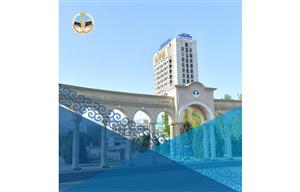 6/8/2023
DATA-DRIVEN DECISION MAKING TRAINING
6/8/2023
DATA-DRIVEN DECISION MAKING TRAINING
On June 10, 2023, at 11:00 a.m., an offline training session will take place at the Al-Farabi Library of Kazakh National University as part of the third module "Data-driven decision making" of the "Academic Leadership Institute" program.
The project was developed by the Graduate School of Education at Nazarbayev University, upon the initiative of the Ministry of Science and Higher Education of the Republic of Kazakhstan.
The objective of the module is to develop professional skills and competencies in teaching, research, and professional development for the employees.
Press Service of Al-Farabi Kazakh National University
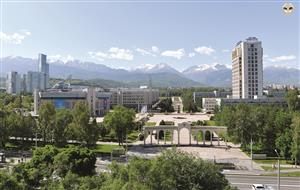 6/8/2023
MY FIRST-YEAR EXPERIENCE
6/8/2023
MY FIRST-YEAR EXPERIENCE
- Main page
- News
MY FIRST-YEAR EXPERIENCE
6/8/2023
All students experience academic pressure from parents and family, but thankfully I was not one of these students. Some students sacrificed so much, like not being able to participate in sports and after-school activities just to maintain a 4.0 GPA so their transcripts will be seen by the desired university. My parents never placed this kind of pressure on me but they always told me to try to understand the subjects. That was the most important thing – coming here and studying in a medical school where your grades have a huge significance as well as your understanding of the ideas. I expected it to be difficult and have a lot of material for us to memorize and understand but one thing I had not expected was the importance of having an organized schedule and balanced lifestyle. It is super important to be organized as this will allow you to not be behind in your studies, and this is especially important in medical school because the pace is fast. Having a balanced lifestyle is probably the number one most important thing because being able to do the things you enjoy, and spend time with loved ones will keep you happy and healthy mentally. I did not expect it to be so hard to balance my life, I want to exercise, eat, and go out, yet I cannot because of my studies. I cannot do the things I enjoy because I am not organized well enough yet. However, this is changing because I have learned to deal with the workload as well, sometimes knowing when to relax and not study. We will be doctors, not robots. How can I instruct and help others be healthy humans if I am not one myself? There were definitely a lot more challenges and struggles, but there were also pleasant and joyful moments. One of the most joyful moments was getting to know my peers, they are all very interesting individuals, and going through the common struggle of being at medical school was enjoyable because we could relate so much. Constantly helping and learning together has strengthened our relationship and I would even add that because of the relationships we formed, this is what is keeping us coming back every morning, every day, and dealing with the difficulties that come with being a medical student. One big piece of advice for first-year medical students is to get close and develop good relationships with your peers and teachers, for they will be with you until the end and they will understand you the most.
Khurshid Umarov,
international student of Higher School of Medicine,
Al-Farabi Kazakh National University
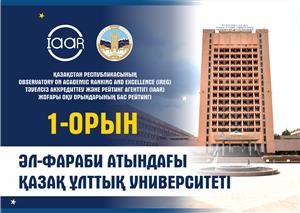 6/8/2023
KAZNU IS THE LEADER IN THE RANKING OF UNIVERSITIES IN KAZAKHSTAN
6/8/2023
KAZNU IS THE LEADER IN THE RANKING OF UNIVERSITIES IN KAZAKHSTAN
According to the results of the independent rating of demanded universities of the Republic of Kazakhstan in 2023, conducted by the Independent Agency for Accreditation and Rating (IAAR) accredited by the Observatory on Academic Ranking and Excellence (IREG), Al-Farabi Kazakh National University was recognized as the first and best university, scoring the highest number of points among other national universities of the country.
Monitoring of the IAAR Rating results showed that, compared with last year, there is a positive dynamics of growth by 22% in the number of joint educational programs. According to the indicator "Academic mobility", this indicator increased by 15%. Active participation in academic mobility programs is noted in such universities as Al-Farabi Kazakh National University, L.N. Gumilev Eurasian National University.
According to the results of the Independent Rating of the demand for universities of the Republic of Kazakhstan – 2023, the top three leaders are headed by Al-Farabi Kazakh National University (375,132 points). The top three universities of the Republic of Kazakhstan included:
- L.N. Gumilyov Eurasian National University (256 734 points);
- Kazakh Agrotechnical University named after S. Seifullin (135 122 points).
Digital ranking of educational programs allows to form a rating of more than 1600 educational programs, and the general rating of universities of the Republic of Kazakhstan. Participation in this national ranking contributes to the growth of the competitiveness of educational services and ensures public awareness of the degree of compliance of the quality of education with market requirements, recognition of teachers and the effectiveness of research activities of the university.
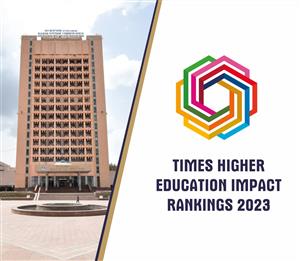 6/2/2023
NEW ACHIEVEMENTS OF KAZNU IN THE RANKING TIMES HIGHER EDUCATION IMPACT RANKINGS 2023
6/2/2023
NEW ACHIEVEMENTS OF KAZNU IN THE RANKING TIMES HIGHER EDUCATION IMPACT RANKINGS 2023
Al-Farabi Kazakh National University has become the only one among Kazakhstani universities to be included in the Times Higher Education University Impact Rankings-2023 for all 17 Sustainable Development Goals (SDGs).
The UN Sustainable Development Goals are aimed at improving the well-being of the population and protecting the planet. The methodology of the Times Higher Education University Impact Rankings is based on the analysis of the following areas of university activity: research, socially oriented programs, resource management, university contribution to education.
In total, 1591 universities of the world are ranked in the Times Higher Education University Impact Rankings (THE IR). According to a number of goals, Al-Farabi Kazakh National University is in the Top 400: SDG 1 "No Poverty", SDG 5 "Gender Equality", SDG 6 "Clean Water and Sanitation", SDG 10 "Reduced Inequalities", SDG 14 "Life below water", SDG 15 "Life on Land".
This year, Al-Farabi KazNU has improved its position on SDG 5 "Gender Equality", rising from position 401-600 to 301-400, as well as on SDG 17 "Partnerships for the Goals" from 801-1000 to 601-800 place.
Al-Farabi KazNU coordinates and actively engages the world academic community in the implementation of the 17 goals of sustainable human development aimed at preserving the planet's resources, ensuring access to quality education and well-being, innovation development, ecosystem conservation
Congratulations to the staff of the Al-Farabi Kazakh National University on a new well-deserved victory!
Press Service of Al-Farabi Kazakh National University
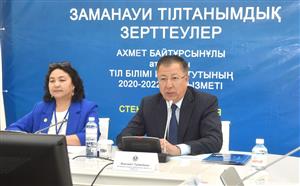 5/31/2023
RECTOR OF KAZNU TAKES PART IN THE CONFERENCE "MODERN LANGUAGE RESEARCH"
5/31/2023
RECTOR OF KAZNU TAKES PART IN THE CONFERENCE "MODERN LANGUAGE RESEARCH"
Chairman of the Board – Rector of Al-Farabi Kazakh National University Zhanseit Tuimebayev took part in the poster conference "Modern Language Research" organized by the Akhmet Baitursynov Institute of Linguistics.The conference brought together linguists, professors, members of philological faculties of universities. The meeting summed up the results of the work of the Akhmet Baitursynov Institute of Linguistics for 2020-2022 and discussed the development of the Kazakh language.
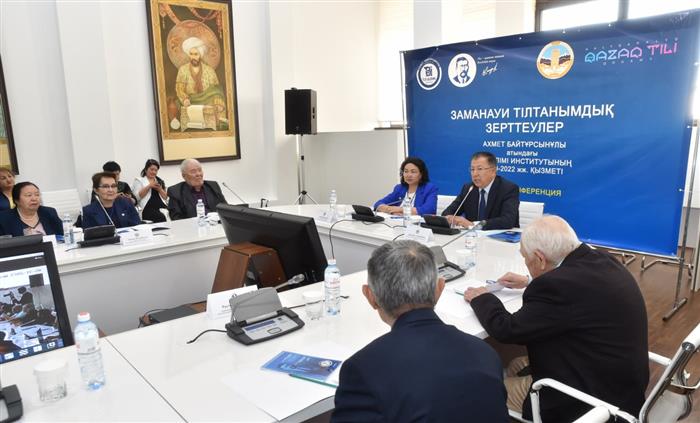
The rector of KazNU Zhanseit Tuimebayev noted the significant work of the Institute in the field of linguistics: "The great teacher of our nation, Akhmet Baitursynov worked at Kazakh University in the first quarter of the last century. An academic center was created on the basis of which the Kazakh Academy of Sciences was subsequently founded. Since then, the historical continuity between higher education institutions and research institutes has been established and continues to this day. A striking example is the cooperation between KazNU and the Akhmet Baitursynov Institute of Linguistics. The Institute still bears the high title of "The Cradle of Science of the Kazakh language". Undoubtedly, in the future linguists will work tirelessly on the development of the Kazakh language as a symbol of our statehood, expanding its scope of application and improving culture," the rector claimed.
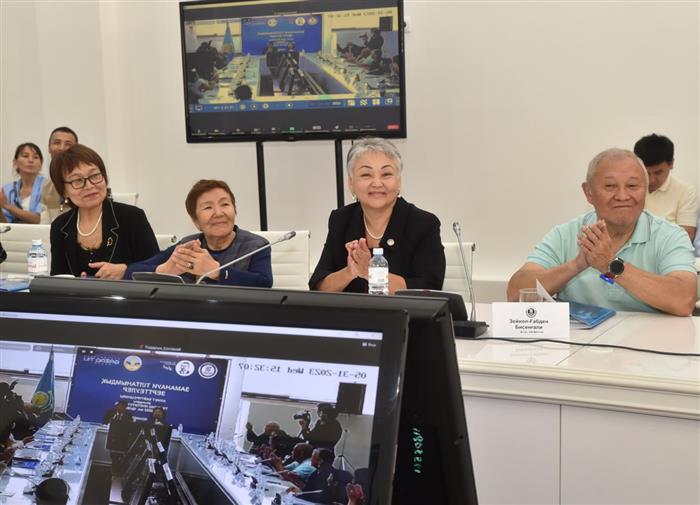
At the end of the speech, Zhanseit Tuimebayev invited the scientists of the Institute to give a leadership lecture at KazNU. Rector urged to develop science together with the Institute of Linguistics.
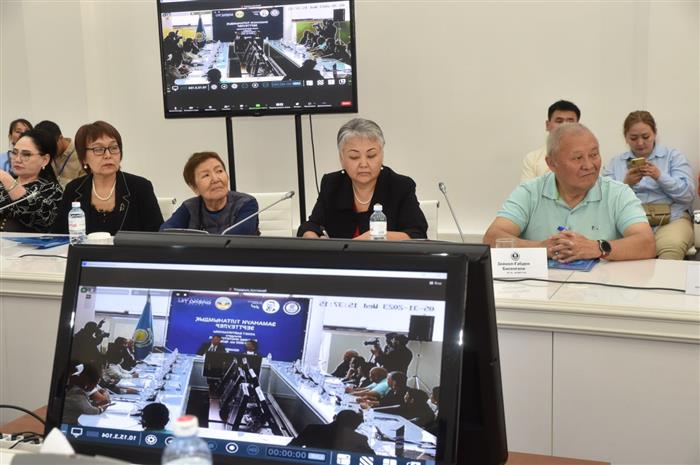
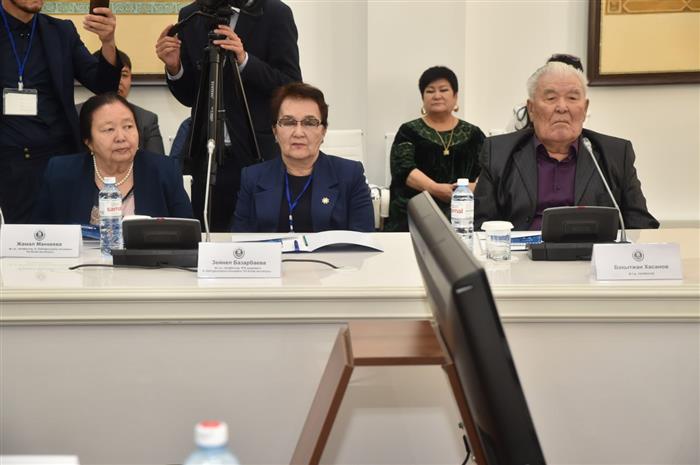
Nine scientific books were also presented during the event. These are: "Language-tool – Graphic Projection of Akhmet Baitursynov's Publications", "Akhmet's Students – 2021", "Scientific and Linguistic Foundations of Kazakh Writing", "Written Communication based on the New Alphabet: Linguistic and Theoretical Research", "Language and Consciousness – 2022", "Social Language Research (2021-2022).)", "Language and Society (2021-2023)", "Language School – 2021", "Language School – 2022".
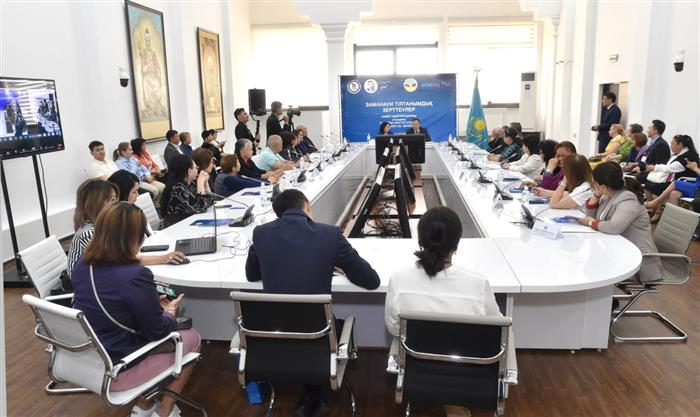
Press Service of Al-Farabi Kazakh National University
7/25/2022 ТАЛАПКЕРЛЕРГЕ АРНАЛҒАН АҚПАРАТ!
7/28/2020 Examination interview for admission to the Al-Farabi Kazakh National University at the Faculty of Medicine

